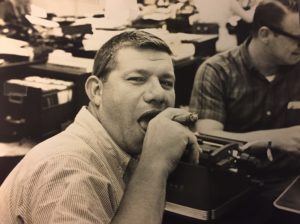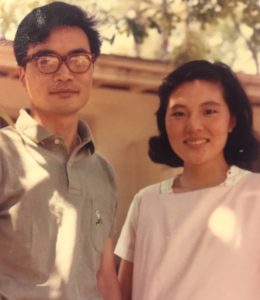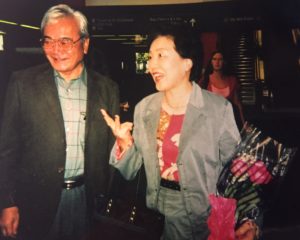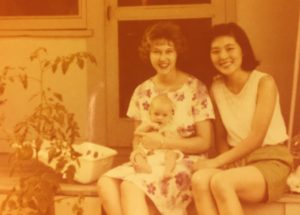It was cool.
That’s first thing I notice when I walked into The Charlotte News newsroom on my first day, in June 1960. It was not boiling hot like my father’s clothes hanger plant, in the basement of a building on Graham Street, where I worked summers during high school. Besides the air conditioning there was that smell peculiar to newsrooms before computers made them look and sound and smell like any other office. The smell of newsprint and ink and glue — there was a glue pot* on every desk and stacks of old newspapers. And lots of cigarette smoke. And that noise I came to love, the clicking keys of typewriters and the constant clacking of the AP and UPI teletype machines.
Occasionally, a reporter would shout, “Copy! Copy boy!” And a boy my age or a little younger, I was 18, would run to his desk, grab copy from them –sometime he would tear it right out of their typewriters — and deliver it to the City Desk on the run.
On deadline the reporters were completely focused, oblivious to anything or anyone around them, punching the keys of their typewriters –one guy with just his two forefingers– and using the cigarette they were smoking to light the next one.
They were working.

I was assigned to the sports desk so I sat down there and waited. After the first edition deadline, about 9:15 a.m., the sports writers leaned back in their chairs, lit up yet another cigarette or cigar and relaxed. They talked to each other about stuff that had nothing to do with work, or gabbed on the phone. Some of them were laughing about something, I didn’t know what.
[This was a job? I had had a job, a real job, and let me assure you, this was not one.]
One of them said to me, “Boy, go to that restaurant on Tryon Street and get me a fried egg sandwich and tell ’em not to put so much mayonnaise on it. And, here, get one for yourself.”
And he handed me some money.
I rode the elevator to the first floor, walked out the door of the building onto the sidewalk and headed down Tryon. It was a glorious day. I was just walking along, making $1 a hour, twice what I used to get for real work. And when I got back with the fried egg sandwiches we were going to sit around, on the clock, and eat them?
I decided right then that I was going to be a newspaperman. And that’s what I did for 42 years.
* Computer savvy people know the terms “cut” and “paste” and that’s what reporters were doing, cutting and pasting. Only they didn’t actually cut, they ripped their copy apart with a pica stick.
Coming Friday: Pass A Heart Or Else


